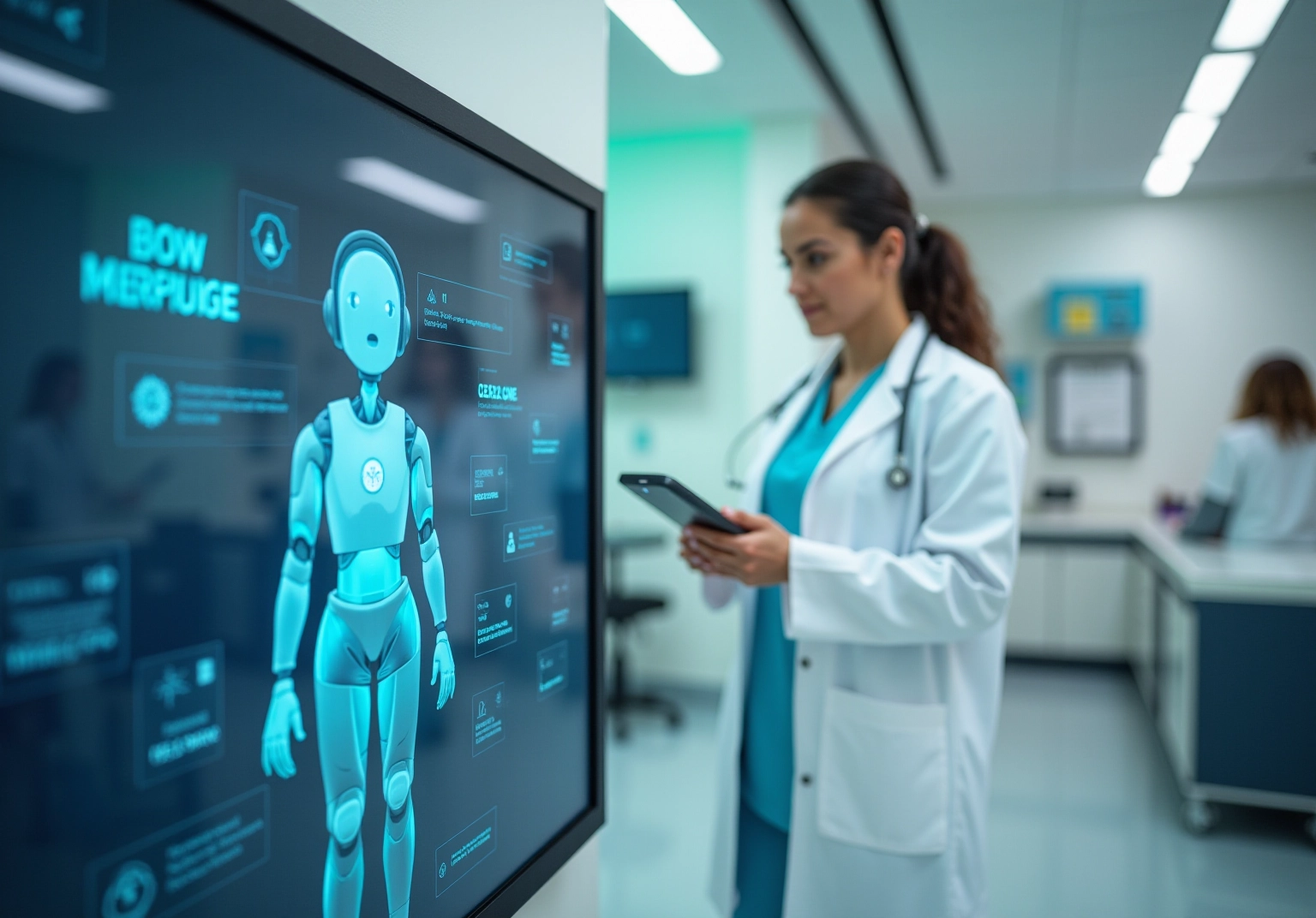
Natural Language Processing (NLP) AI is revolutionizing healthcare efficiency by addressing significant challenges faced by providers. By streamlining administrative tasks, enhancing diagnostic accuracy, and improving patient engagement through automated tools, NLP offers a comprehensive solution.
This article illustrates the transformative impact of NLP, detailing its role in:
Ultimately, these advancements lead to improved care delivery and enhanced financial outcomes for healthcare providers, making a compelling case for the adoption of NLP technologies.
NLP is transforming healthcare by enabling more efficient workflows and more accurate clinical decisions. Leveraging the capabilities of AI, providers are enhancing patient care, refining diagnostics, and optimizing administrative processes.
Yet, integrating these technologies into existing systems comes with challenges. What are the most impactful applications of NLP in healthcare, and how can organizations adopt them effectively?
The Inferscience HCC Assistant uses advanced NLP AI to transform Hierarchical Condition Categories (HCC) coding. It conducts real-time gap analyses on claims files, identifying overlooked codes and reducing manual workload for coders. This boosts compliance with Medicare regulations and maximizes reimbursement.
NLP supports seamless data extraction from EHRs, streamlining coding and minimizing errors. In fact, NLP can uncover 55% more diagnoses than traditional ICD-10-CM codes.
With a remarkable 93% client retention rate, the advantages of automating HCC coding through NLP are clear: enhanced accuracy, reduced administrative burdens, and superior financial outcomes for healthcare professionals.

NLP-driven sentiment analysis tools interpret patient feedback by analyzing large volumes of unstructured data to reveal trends and sentiments. This enables providers to identify areas for care improvement. A study found that 92% of individuals believe improving customer experience should be a priority in healthcare.
Real-world applications include visualizing trends in patient sentiment from survey responses to identify issues like long wait times or communication gaps. Addressing these trends proactively strengthens patient satisfaction and relationships.
The sentiment analysis market, valued at USD 3.15 billion in 2021, is projected to grow 14.4% annually through 2030. Despite challenges—such as detecting sarcasm—sentiment analysis remains a vital tool for improving care quality and operational efficiency. By employing advanced sentiment analysis techniques, medical professionals can gain valuable insights into individual emotions and opinions, thereby enhancing care delivery and operational efficiency.
NLP-powered clinical documentation tools convert spoken or written notes into structured data in real-time. This reduces time spent on manual entry and decreases the risk of documentation errors. Inferscience’s HCC Assistant integrates with EHRs to analyze both structured and unstructured data, suggesting accurate HCC codes at the point of care.
Studies show that AI scribes reduce note-taking time from 5.3 to 4.8 minutes per appointment, freeing clinicians to spend more time with patients. In fact, 71% of patients reported longer conversations with providers thanks to these tools. This shift enhances the overall quality of care, as healthcare professionals can engage more effectively with patients.
By improving coding accuracy and RAF scores, Inferscience’s HCC Assistant contributes to better care delivery and optimized financial performance.
Additionally, AI is anticipated to lower medical expenses while preserving or enhancing the quality of care, particularly in HCC coding and risk adjustment, positioning it as a financially advantageous investment for medical organizations. By optimizing HCC coding and improving RAF scores, Inferscience’s HCC Assistant empowers medical professionals to deliver high-quality care.

NLP AI enhances diagnostic accuracy by analyzing medical records and extracting relevant clinical data. By identifying patterns in unstructured notes and flagging possible diagnoses, NLP helps clinicians make more informed decisions and reduce overlooked conditions.
In one study, NLP achieved a recall of 95.8% and specificity of 97.4% when identifying fall events from emergency department notes—demonstrating strong real-world accuracy.
Clinicians note that NLP strategies improve diagnostic precision and outperform conventional methods. Inferscience’s HCC Assistant automates the collection and analysis of patient data, integrating with EHR systems to streamline workflows and improve Medicare Advantage funding through better RAF scores. This sentiment is reflected in various case studies where natural language processing AI has been employed to examine medical records, leading to enhanced outcomes.
By embedding NLP into clinical processes, providers also ensure compliance with regulatory standards while focusing on patient care. As healthcare evolves, NLP’s role in diagnostic support will be essential to improving outcomes.
Furthermore, the incorporation of natural language processing AI into clinical processes aids in adhering to regulatory standards, enabling medical professionals to focus on delivering quality care while minimizing administrative burdens. As medical care continues to develop, the use of natural language processing AI in examining client records will play an essential role in enhancing clinical decision-making and ultimately improving outcomes for individuals.
NLP AI is enhancing telemedicine by enabling real-time transcription and analysis of virtual visits. This ensures that clinicians capture critical information during consultations and supports efficient symptom triage based on patient-reported data.
This integration not only improves clinical outcomes but also elevates the patient experience. A reported 62% of patients felt their care improved with AI tools, while 86% of physicians said AI-enhanced systems offered better insights into patient needs.
To fully harness the advantages of natural language processing AI, medical professionals should consider incorporating natural language processing AI tools into their telemedicine systems, ensuring they utilize technology to enhance client engagement and care quality.
NLP-driven predictive analytics enables providers to analyze historical data and anticipate future healthcare needs. By identifying high-risk individuals, NLP supports early intervention and preventive care.
Care gaps—missed screenings or follow-ups—can be addressed using NLP insights. Research indicates that effective population health management, supported by natural language processing AI insights, can significantly decrease hospital readmissions and emergency room visits, ultimately leading to improved overall health outcomes.
Moreover, care gaps—instances where individuals do not receive recommended checks or screenings—can be effectively mitigated through insights derived from natural language processing AI. As medical leaders increasingly recognize the imperative of anticipating individual needs through natural language processing AI, integrating these insights into clinical workflows is becoming essential for delivering high-quality care.

NLP-powered chatbots enhance patient engagement by offering 24/7 support, handling inquiries, and scheduling appointments. These conversational tools reduce wait times and improve access to information.
This innovative technology not only boosts user satisfaction but also alleviates the administrative burden on medical staff, resulting in a documented 30% reduction in administrative tasks, as evidenced by case studies from leading medical organizations. The practical applications of chatbots have demonstrated their effectiveness in enhancing interactions, with medical professionals noting that these tools foster improved communication and engagement.
Inferscience’s HCC Assistant exemplifies how this technology can be integrated into medical systems to enhance coding accuracy and streamline workflows, ensuring practitioners receive optimal funding from Medicare Advantage contracts while improving overall risk adjustment processes. Testimonials from medical professionals utilizing the HCC Assistant underscore its effectiveness in reducing coding errors and enhancing workflow efficiency, further affirming its value in the medical sector.

NLP tools are accelerating medical research by automating the review of literature and clinical data. These systems identify key findings, flag trends, and hlp researchers stay current—contributing to evidence-based care.
NLP also improves coding accuracy by addressing inconsistencies and reducing human error. The global medical NLP market, valued at $4.9 billion in 2023, is projected to grow at 34.7% annually, with healthcare applications making up 20% of the market by 2024. This underscores the increasing reliance on natural language processing AI for enhancing research efficiency and improving medical interoperability.
By helping researchers efficiently manage the growing volume of medical data, NLP is transforming research workflows and clinical insights.
NLP supports compliance by analyzing clinical documentation and flagging risks in real time. It reviews billing codes and documentation practices to ensure alignment with regulatory standards.
Organizations using NLP for compliance see up to 332% ROI. For instance, a 300-bed hospital investing $1.2 million gained $5.2 million in return.
NLP enables faster issue resolution, decreasing average response time from 12.7 to 3.1 days. Additionally, by optimizing HCC coding documentation through AI-driven solutions, medical organizations can improve Medicare reimbursements and elevate RAF scores, ultimately saving an average of $3.7 million annually through automated compliance processes. This underscores the financial advantages of adopting such technologies, as evidenced in various case studies.
As compliance standards evolve, NLP ensures organizations can adapt efficiently and effectively.
Natural language processing AI plays a crucial role in revolutionizing personalized medicine by meticulously analyzing patient-specific data to inform treatment decisions. By extracting valuable insights from electronic health records, genetic profiles, and clinical notes, natural language processing AI empowers medical providers to develop tailored treatment plans that address the unique needs of each individual.
For example, NLP can identify genetic markers associated with specific conditions, enabling targeted therapies that significantly enhance treatment efficacy. This personalized approach not only improves patient outcomes but also fosters a more patient-centered healthcare experience, ultimately leading to increased satisfaction and superior health results.

NLP is reshaping healthcare by improving efficiency, accuracy, and patient engagement across the care continuum. From automated documentation and sentiment analysis to predictive analytics and compliance monitoring, NLP delivers measurable value.
Adopting NLP tools allows healthcare providers to streamline workflows, reduce administrative costs, and personalize care. Tools like Inferscience’s HCC Assistant demonstrate how AI-driven solutions are helping providers maximize reimbursements, reduce coding errors, and elevate patient outcomes.
As the industry evolves, organizations that embrace NLP will be better positioned to meet future challenges and deliver high-quality care.